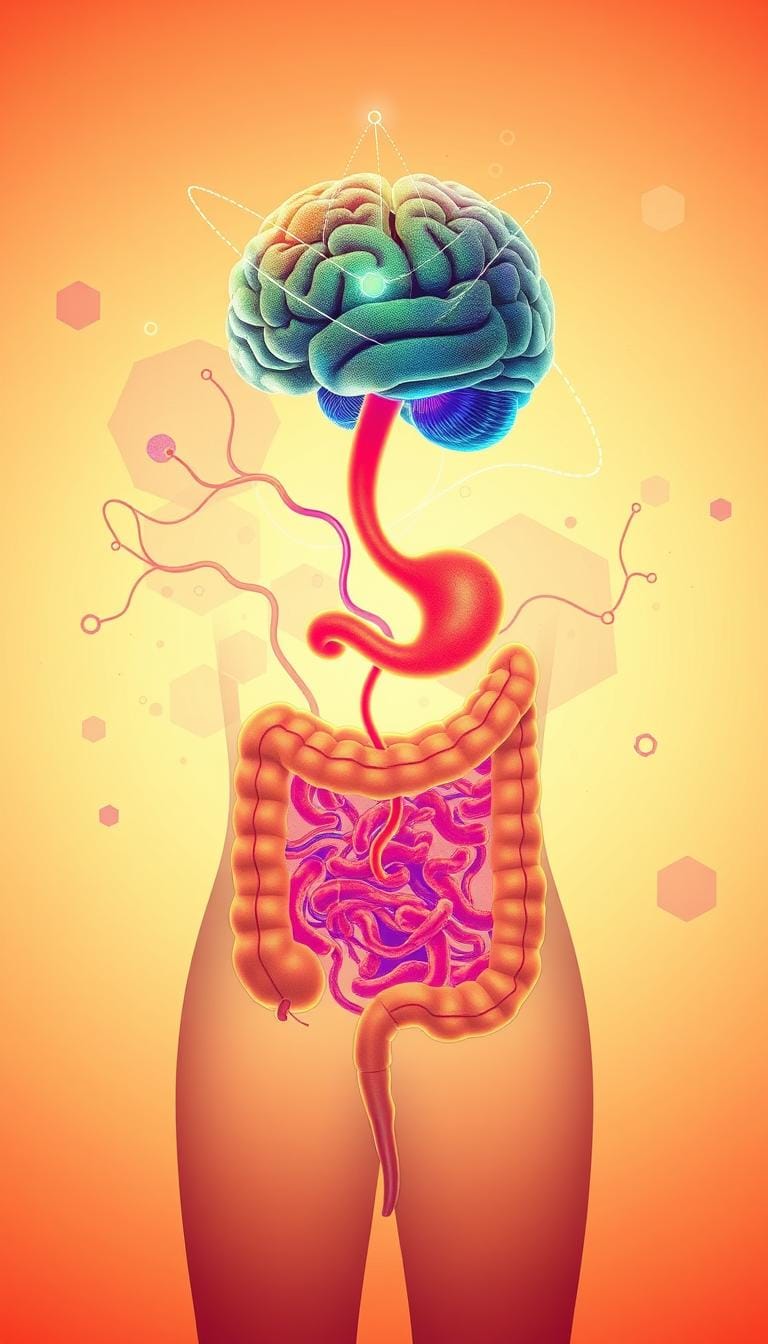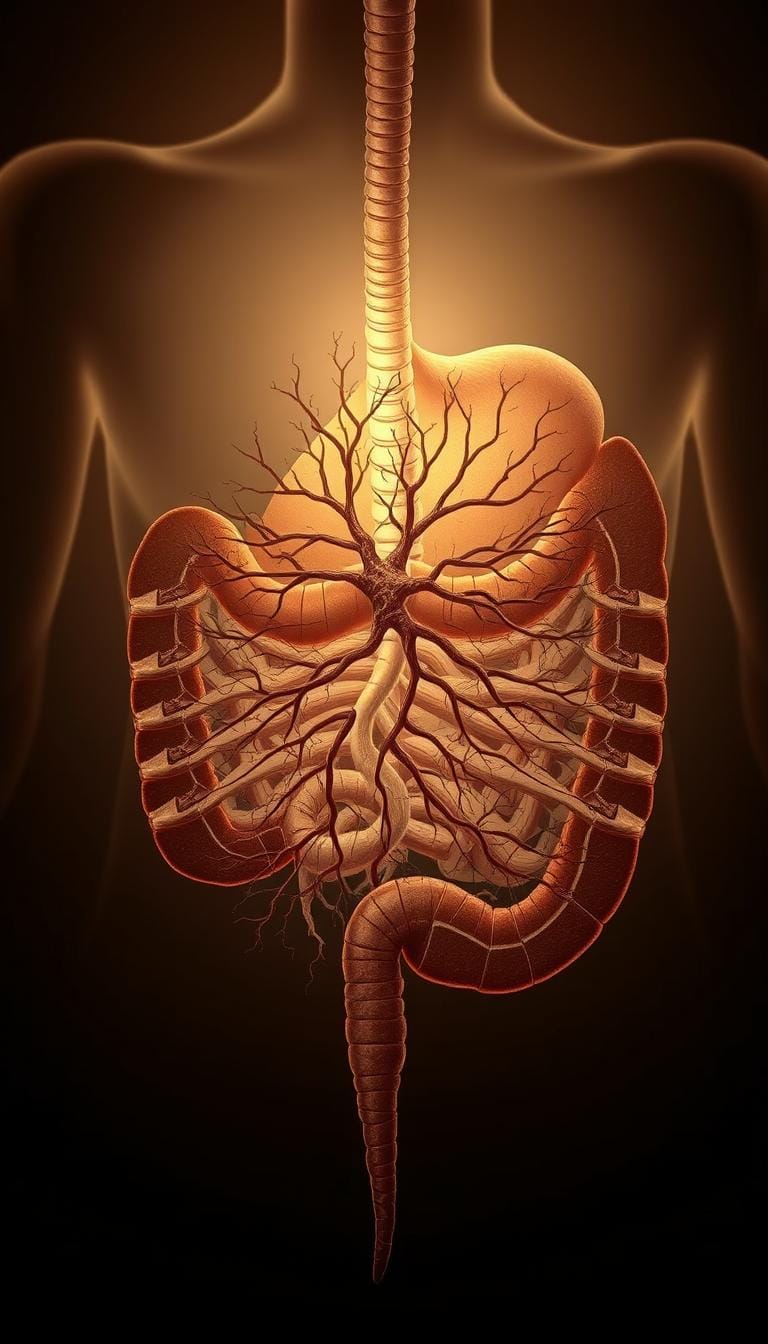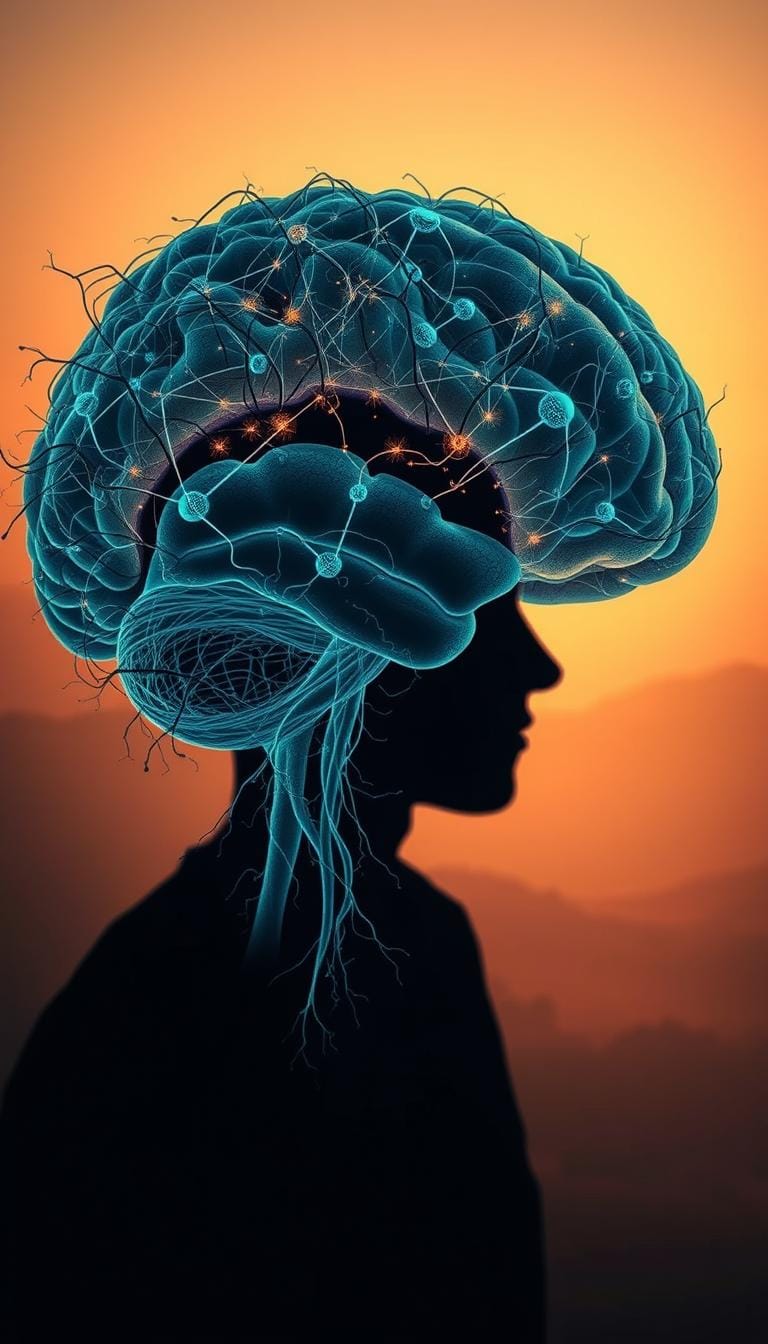Gut-Brain Axis: 5 Surprising Ways Digestion Controls Your Mood
Table of Contents
Ever felt a strong link between your stomach and feelings? You’re not alone. The gut-brain axis is key in controlling our mood. It’s more interesting than you might think.

Our digestion affects our emotions in surprising ways. What we eat can change how we feel. Some digestive problems can make us feel anxious or sad. By learning about the intricate relationship between our gut health and brain function, we can improve our well-being.
In this article, we’ll look at five surprising ways digestion affects our mood. We’ll dive into the complex and fascinating world of the gut-brain axis.
The Hidden Connection Between Your Gut and Brain
Our gut and brain are linked in a complex way. This link affects our mood, thinking, and overall health. The enteric nervous system (ENS), or “second brain,” plays a big role in this connection. It makes neurotransmitters similar to those in the brain, helping control our body’s functions.

What Science Reveals About This Crucial Link
Research shows the gut and brain talk to each other through the vagus nerve. This nerve is key in the gut-brain axis. It lets the gut and brain share information, affecting our feelings, thinking, and health.
Studies have found that changes in the gut microbiota can affect our brain and behavior. This shows how important it is to keep our gut microbiome healthy.
Why Your Digestive System Is Called “The Second Brain”
The enteric nervous system can work on its own, making neurotransmitters for digestion. This ability has earned it the nickname “second brain.”
| Key Features | Gut | Brain |
|---|---|---|
| Nervous System | Enteric Nervous System (ENS) | Central Nervous System (CNS) |
| Neurotransmitters | Produces serotonin, dopamine | Produces serotonin, dopamine |
| Function | Regulates digestion, influences mood | Regulates cognitive function, influences mood |
Understanding the Gut-Brain Axis: A Two-Way Communication System
The gut and brain talk to each other in a two-way system. This system is key to our mental health. It involves many pathways for information exchange between the gut and brain.

The Vagus Nerve: Your Gut’s Direct Line to the Brain
The vagus nerve is a main link in the gut-brain axis. It helps send signals from the gut to the brain. This affects our mood and health.
How Your Gut and Brain Talk to Each Other
The gut and brain communicate through several ways. This complex interaction is vital for our health and balance.
Chemical Messengers That Bridge the Gap
Chemical messengers like neurotransmitters and hormones are key. They help the gut and brain share information. This affects our mood, hunger, and thinking. A healthy gut microbiome is important for our mental health.
The Role of the Immune System in Communication
The immune system is also important in the gut-brain axis. It helps control the communication between the gut and brain. This can affect our mood and thinking, mainly when we’re sick or inflamed.
Meet Your Gut Microbiome: The Trillions of Microbes Affecting Your Emotions
The gut microbiome is a complex world of trillions of microbes. It’s key to our emotional health. These tiny organisms in our intestines do more than digest food. They also shape our mood, emotional reactions, and mental health.
The Ecosystem Living Inside You
Our gut is a home to many bacteria, viruses, fungi, and more. This community is vital for our intestinal barrier’s health. A balanced gut microbiome helps us absorb nutrients, makes vitamins, and fights off bad germs.
How Gut Bacteria Influence Brain Chemistry
Gut bacteria make substances that change our brain chemistry. For example, some bacteria make neurotransmitters or hormones that impact our mood. The gut and brain talk to each other, influencing each other’s health.
Beneficial vs. Harmful Bacteria
Not all gut bacteria are good for us. Some support our health, while others can cause disease. Good bacteria keep our gut barrier healthy. Too many bad bacteria can lead to mental health problems.
The Microbiome Development Timeline
The gut microbiome starts growing at birth and keeps changing. Diet, lifestyle, and antibiotics can change our gut’s makeup. Knowing how it develops helps keep our gut bacteria in balance.
Surprising Way #1: Your Gut Produces Most of Your Serotonin
Did you know your gut makes most of your serotonin? This important neurotransmitter helps control your mood. It’s often called the “happy chemical” because it affects how we feel, eat, and sleep. This shows how closely our digestive system and brain are connected.
The “Happy Chemical” Made in Your Intestines
Serotonin is made by cells in your intestines. These cells send serotonin into your blood. The majority of your serotonin comes from your gut, not your brain. This serotonin is key for mood, appetite, and how your gut moves.
How Digestive Health Impacts Serotonin Production
Your digestive health affects how much serotonin you make. An imbalance in gut bacteria, or dysbiosis, can change serotonin levels. A healthy gut microbiome is vital for good serotonin levels. Diet, stress, and antibiotics can upset this balance, affecting mood.
Real-Life Examples of Gut-Serotonin Connection
People with irritable bowel syndrome (IBS) often feel depressed and anxious. This shows the link between gut health and mood. A study in the Journal of Clinical Gastroenterology found IBS patients had different serotonin signals, leading to their symptoms.
Foods That Support Serotonin Production
Some foods help make more serotonin in your gut. These include:
| Food | Nutrient | Benefit |
|---|---|---|
| Oatmeal | Complex carbohydrates | Increases tryptophan availability |
| Fatty fish | Omega-3 fatty acids | Supports brain health |
| Dark chocolate | Tryptophan | Boosts serotonin levels |
Eating these foods can help your gut health and serotonin levels.
Surprising Way #2: Inflammation in Your Gut Can Trigger Anxiety and Depression
Our digestion plays a big role in how we feel, thanks to the gut-brain axis. This network lets our gut and brain talk to each other. It’s surprising how inflammation in the gut can lead to anxiety and depression.
The Inflammation-Mood Connection
Studies show that inflammation in the body, like in the gut, affects our mental health. When the gut is inflamed, it releases molecules that cause more inflammation. These molecules can change our mood, making us feel more anxious and depressed.
The link between inflammation and mood is complex. But it’s clear that lowering inflammation is key for good mental health.
How Leaky Gut Syndrome Affects Mental Health
Leaky gut syndrome is when the gut lining gets too loose. This lets toxins and undigested food into the bloodstream. This can start an immune response and cause inflammation.
This inflammation can reach the brain, leading to anxiety and depression. So, fixing leaky gut syndrome is important for better mental health.
Inflammatory Foods to Avoid
Some foods can make gut inflammation worse. These include:
- Processed foods with lots of sugar and unhealthy fats.
- Gluten in wheat, barley, and rye, which can irritate some people.
- Dairy products with lactose or other irritants.
Anti-Inflammatory Strategies for Better Mood
There are ways to fight inflammation and boost mood. These include:
- Eating an anti-inflammatory diet full of fruits, veggies, and omega-3s.
- Doing regular exercise, which fights inflammation.
- Using stress-reducing techniques like meditation or yoga.
By trying these strategies, people can lower gut inflammation and feel better mentally.
Surprising Way #3: Stress Directly Impacts Your Digestive Function
Stress triggers our body’s ‘fight or flight’ response. This affects not just our mind but also our digestive system. Chronic stress can cause long-term digestive problems.
Why You Get “Butterflies” When Nervous
Feeling “butterflies” in our stomach when nervous is common. Stress hormones like cortisol and adrenaline slow down digestion. They prepare our body to either fight or flee.
This reaction is controlled by the enteric nervous system. Often called the “second brain,” it manages our gastrointestinal tract. The enteric nervous system works on its own but is linked to our central nervous system through the vagus nerve.
When stressed, this connection can change gut motility, secretion, and blood flow. This affects our digestive health.
The Stress-Digestion-Mood Cycle
Stress, digestion, and mood are linked in a cycle. Stress can cause digestive problems, which can then affect our mood. For example, gut inflammation from stress can release pro-inflammatory cytokines. These have been linked to depression and anxiety.
| Stress Factor | Impact on Digestion | Effect on Mood |
|---|---|---|
| Cortisol Release | Slows down digestion | Increased anxiety |
| Adrenaline Surge | Reduces gut motility | Feelings of unease |
| Inflammation | Gut barrier disruption | Depression |
Breaking the Cycle with Stress Management
Managing stress is key to breaking the cycle. Techniques like meditation, yoga, and deep breathing can reduce stress. This improves digestive health and mood.
How Chronic Stress Damages Gut Health
Chronic stress damages gut health by keeping the stress response active. This changes the gut microbiota, increases inflammation, and weakens the gut barrier. Over time, this can lead to gastrointestinal disorders and mood issues.
Surprising Way #4: Your Diet Shapes Your Mood Through Gut Bacteria
My diet is key to my mood, thanks to my gut and brain talking to each other. What I eat changes the balance of gut bacteria. This balance affects how I feel mentally.
Foods That Boost Mood-Enhancing Bacteria
Eating certain foods can help grow good bacteria. This improves how my gut and brain talk to each other. It also helps me feel better.
Prebiotics: Feeding Your Good Bacteria
Prebiotics are special fibers that feed good bacteria. They help these bacteria grow and work well. Foods like asparagus, bananas, and onions are full of prebiotics.
Eating these foods helps keep my gut healthy.
Probiotics: Introducing Beneficial Microbes
Probiotics are live bacteria and yeasts that are good for my gut. I can find them in foods like yogurt, kefir, and sauerkraut. Adding these foods to my diet keeps my gut balanced.
This balance helps me stay in a good mood.
Foods That Harm Your Gut-Brain Connection
Some foods are bad for my gut health. Eating too much of processed foods, sugar, and unhealthy fats can upset my gut bacteria. This can make me feel down.
Being careful about what I eat is important. It helps keep my gut and brain working well together.
By choosing the right foods, I support my gut and mental health. It shows how connected what we eat is to how we feel and our overall health.
Surprising Way #5: Gut Dysbiosis Can Cause Brain Fog and Cognitive Issues
Gut dysbiosis, or an imbalance in the gut microbiome, is linked to brain fog and cognitive problems. The gut and brain are connected through the gut-brain axis. This network involves the exchange of signals and chemicals. When the gut microbiome is out of balance, it can cause cognitive issues.
When Your Gut Microbiome Is Out of Balance
Gut dysbiosis happens when the natural balance of the gut microbiome is disrupted. This can be due to poor diet, stress, or antibiotics. This imbalance can lower beneficial neurotransmitter production and increase inflammation. Both can harm cognitive function.
The Link Between Gut Health and Mental Clarity
The health of the gut microbiome is linked to mental clarity and cognitive function. Research shows that those with gut dysbiosis often face brain fog, memory issues, and trouble concentrating. Fixing the gut microbiome balance can improve these problems.
Case Studies: Cognitive Improvement Through Gut Healing
Studies show that healing the gut can greatly improve cognitive function. For instance, a study on IBS patients found that those given probiotics had better cognitive function than those given a placebo.
Early Warning Signs of Gut Dysbiosis
It’s important to recognize early signs of gut dysbiosis to prevent cognitive issues. Common signs include bloating, digestive problems, and fatigue. Addressing these early can help prevent more severe cognitive problems.
| Signs of Gut Dysbiosis | Cognitive Effects |
|---|---|
| Bloating and digestive issues | Brain fog and confusion |
| Fatigue and lethargy | Memory problems and difficulty concentrating |
| Mood swings and irritability | Decreased mental clarity and focus |
Practical Steps to Improve Your Gut-Brain Connection
Improving your gut-brain connection is possible with diet, lifestyle, and mindful habits. Making a few changes can boost your mental health and overall well-being.
Dietary Changes That Support Gut and Mental Health
To better your gut-brain axis, eat a balanced diet. Include fiber, polyphenols, and omega-3 fatty acids. Good foods are:
- Fermented foods like yogurt and sauerkraut
- High-fiber foods such as fruits, vegetables, and whole grains
- Prebiotic-rich foods like asparagus and bananas
Lifestyle Habits That Strengthen Your Gut-Brain Axis
Along with diet, lifestyle habits are key. They include:
- Regular exercise to reduce stress and improve gut motility
- Adequate sleep to help regulate the gut microbiome
- Stress management techniques like meditation or deep breathing
When to Seek Professional Help
If gut issues or mental health concerns last, get professional help. A healthcare provider can find the root cause and create a plan to improve your gut-brain connection.
Conclusion: Nurturing Your Gut for Better Mental Wellbeing
Taking care of your gut is key for good mental health. The link between gut health and brain function is clear. By focusing on your digestive system, you boost your overall health and mental state.
A healthy gut microbiome is vital for making neurotransmitters like serotonin, which affects mood. An imbalanced gut can cause anxiety, depression, and other mental problems. Simple diet and lifestyle changes can help keep your gut and brain in sync.
Eating fermented foods like yogurt and sauerkraut supports good bacteria. Regular exercise, enough sleep, and managing stress also help. These habits can improve your mental health and life quality.
Understanding the connection between gut health and brain function is the first step to better mental health. Making smart choices about what you eat and how you live can nurture your gut and support your mental wellbeing.






